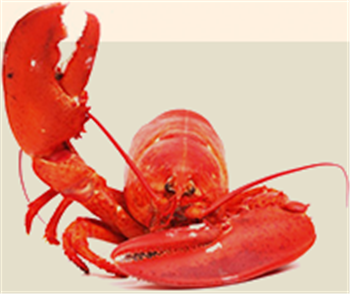(单词翻译:单击)

Today we regard the oyster and lobster as luxury foods, but it has not always been so. Oysters have been commercially farmed since the time of the Romans and have a remarkable talent: when collected, they close their watertight shells, trapping seawater inside. This useful skill doubtless evolved so they could survive being beached at low tide. But it meant that oysters could be shovelled into a barrel, carted to a city, and left under a bar — sometimes for weeks — while remaining alive and fresh.
今天,牡蛎和龙虾被视为奢侈的食物,但情况并非一直如此。从罗马时代起,人们就一直对牡蛎进行商业化养殖。牡蛎有一种非凡的本领:当被采集的时候,它们会将自己的外壳闭合得滴水不漏,将海水封存在里面。这种有用的技能无疑是为了在退潮搁浅时存活下来而进化出来的。但这也意味着人们可以把牡蛎铲进桶里,用车运往城市并放在酒吧里——有时一放就是几星期——而牡蛎在此期间一直保持鲜活。
Lobsters, or similar forms of invertebrate, crustacean arthropod have been around longer than humans and it is quite possible that we have been eating them for a very long time. They are also unique among the food we eat today in that we often buy them alive and kill them ourselves. They are plentiful, at no particular risk of extinction, and utterly delicious, having sweeter and better-textured flesh than fish. They survive in a wide range of sea temperatures and are easiest caught by simple and sustainable methods.
龙虾,或者类似的无脊椎甲壳类节肢动物,比人类的历史更长,很可能我们食用它们的时间也很长。在今天的食物中,它们也比较独特,因为我们经常购买活的,并自行在吃的时候杀了它们。它们的数量很多,没有灭绝的危险,而且十分美味,比鱼肉更鲜甜口感更好。它们在温度范围很广的海水中都能生存,使用简单和可持续的方法就很容易捕捞。
Like oysters, the creatures’ ability to survive out of water meant they could be transported far inland and supply spankingly fresh protein long before refrigeration made it possible to distribute other forms of fresh fish. For this reason, lobster and oysters were often considered a food of the poor in industrialised cities. Nineteenth-century prison governors in some coastal states of the US were forbidden to feed their prisoners lobster more than a few times a week, as it was considered a “cruel and unusual” privation.
就像牡蛎一样,这类生物在出水后存活的能力都很强,人们可以把它们运往遥远的内陆。远在制冷技术使得分销其他种类的鲜鱼变为可能之前,它们就在为人类提供极为新鲜的蛋白质。因此,龙虾和牡蛎过去常被视为工业化城市中穷人的食物。在19世纪的美国,一些沿海州的监狱每周给囚犯提供龙虾的次数是有上限的,因为顿顿吃龙虾被视为一种“残酷而不寻常的”煎熬。
At low tide you can still wander along the muddy banks of the Thames in London and see vast “middens” of discarded oyster shells. These mark the spot of bank-side pubs, where revellers would consume huge numbers of oysters and throw the shells into the river. As the deposits are still there after centuries we can assume London’s dock labourers were ordering oysters at a far greater rate than the wealthiest occupants of the City can afford to today.
在退潮的时候,你依然可以漫步伦敦泰晤士河泥泞的河岸,看到丢弃的牡蛎壳形成的巨大“贝丘”。它们与河岸酒吧的位置对应,泡这些酒吧的人会吃掉大量牡蛎,然后把牡蛎壳扔进河里。在数个世纪后,这些沉积物依然在这些地方,我们可以设想,当年伦敦的码头工人食用牡蛎的数量远远超过当今伦敦金融城最富裕的居民所能负担的程度。
As industrialised cities developed, what we would now call “supply chains” were created and preserved, packaged, tinned and eventually chilled products became the more convenient diet. Prestige restaurants, though, never fell out of love with food so fresh that it still moved, and developed dishes that remain in the canon today. It is hard to go wrong with lobster Newburg (egg-enriched cream and cognac), lobster a [grave accent]l’armoricaine (tomato, tarragon, shallots), or the king of the lobster dishes, first created by Auguste Escoffier in about 1880. [cut 1849] Lobster Thermidor is superbly rich and massively complicated. It is also delicious, combining a cream sauce enriched with eggs, sherry and mushrooms with a gratin topping.
随着工业化城市的发展,人们创建了我们现在所称的“供应链”,腌制、包装、罐头以及最后出现的冰鲜产品成为了最方便的食品。不过,讲究的餐厅从未放弃对还能动的极其新鲜的食物的喜爱,并且研制出了一些到今天还经久不衰的菜肴。到餐厅点龙虾钮堡(lobster Newburg,配料包括富含鸡蛋的奶油和白兰地)或者美国龙虾(lobster a l’armoricaine,配料包括番茄、龙蒿和葱)总是没错的,还有就是奥古斯特埃斯科菲耶(Auguste Escoffier)在1880年前后首创的金牌龙虾菜:热月龙虾(Lobster Thermidor)风味浓郁,做法繁复。这道菜也十分美味,配料包括富含鸡蛋的奶油酱、雪莉酒、蘑菇加上焗烤脆皮。
While some restaurants still feature oyster and lobster as premium dishes, it is not unusual to be offered oysters, fried or baked, as affordable starters — something never seen a few years ago. In the run up to Christmas, the discount supermarket chains Lidl and Iceland are offering frozen lobsters for under 5 (they make a great Thermidor).
尽管一些餐厅依然将牡蛎和龙虾作为高端菜肴提供,但将炸牡蛎或者烤牡蛎作为价格较为低廉的前菜供应的餐厅如今也不少——这种事在几年前还闻所未闻。圣诞节即将来临之际,英国的连锁折扣超市Lidl和Iceland出售价格低于5英镑的冰冻龙虾(用它们来烹饪热月龙虾味道极好)。
Lobsters and oysters are robust creatures and they breed vigorously. We have artificially kept them as prestige foods, so it is unsurprising that their price is now dropping.
龙虾和牡蛎生命力顽强,繁殖能力也很强。它们昂贵的身价是人为的,因此现在价格下降也就不令人惊讶了。
Now that previously aristocratic salmon is the go-to protein at every corporate event or provincial wedding, perhaps we should wonder at what is next. The answer may again come from under the sea. In the 1930s Josef Stalin ordered the introduction of the red king or Kamchatka crab to the Barents Sea to create a new source of cheap protein for Soviet workers. Eventually the crabs, indigenous to the northern Pacific, grew to accept their warmer home, breeding prolifically, moulting more regularly and growing up to 2m in leg span.
既然以前只有富人才能享用的三文鱼成了企业活动或者婚礼上的首选蛋白质,或许我们应该想想下一个会轮到谁。答案或许依然来自于海中。上世纪30年代,约瑟夫斯大林(Josef Stalin)下令把红帝王蟹(即勘察加蟹,Kamchatka crab)引入巴伦支海(Barents Sea),目的是为苏联的工人开辟一种新的廉价蛋白质来源。最终,这种原产于北太平洋的螃蟹开始适应更温暖的新家,开始大量繁殖、更加频繁地换壳,足展长度达到了2米。
They were so successful that they began migrating across the ocean floor in vast packs. Spider crabs the width of cars are, even now, moving along the bottom of the North Sea towards the UK coast, eating everything in their path. It is the stuff of science fiction movies.
它们繁殖得太好,因此开始成群地穿过海底进行迁徙。即使是现在,有汽车宽度那么大的蜘蛛蟹也在北海海底向英国海岸迁移,吃掉它们行进路途上的一切。这简直就是科幻电影中发生的事情。
At the moment, Kamchatka crab is a delicacy in London restaurants, where the ability to select a live, angry, metre-wide creature from a tank and have it killed and brought steaming to the table is a spectacle that delights the super rich. But the crabs have reached the Norwegian coast. It is only a matter of time before they come ashore here, lurching up the beach having acquired a taste for human flesh — so we need to start acquiring a taste for theirs, fast. King crabmeat is superb, with a meatier texture and sweeter taste than its skinny little capitalist cousin. Surely, government must intervene. Drop the prices — we need to eat them before they eat us.
现在,勘察加蟹是伦敦餐厅中的一道佳肴。看着厨师从水箱里选择一只鲜活、张牙舞爪、宽度达到一米的勘察加蟹,宰杀并蒸好端上桌,成为了超级富豪的一件乐事。但这些螃蟹们已经抵达了挪威海岸。这些螃蟹在英伦三岛登陆,在尝到人肉的滋味后横行海滩只是时间问题——因此,我们要先下手为强,先把它们当成美味,而且要快。红帝王蟹的肉质绝佳,比它们在资本主义国家生长的瘦小兄弟更肥硕,更鲜甜。政府必须要加以干预。降低价格——我们得在它们吃掉我们之前吃掉它们。


